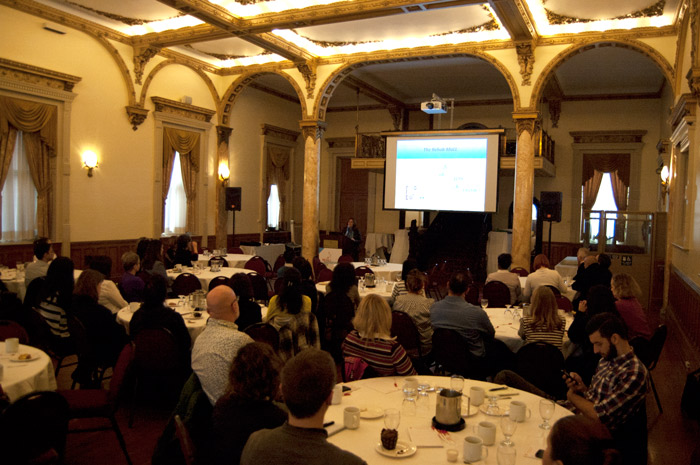McGill’s annual Innovation Week (MIW) showcased developments in technology, innovation, and entrepreneurship. Packed with more than 20 events between Nov. 15 and Nov. 20, MIW explored a wide range of issues, including intellectual property, the future of education, social innovation, and food security.
The main organizer of MIW, and Director of Innovation in Practice at McGill’s Office of Innovation and Partnerships, Isabelle Péan, spoke to the new initiatives of this year’s MIW.
“This year, the major initiative of Innovation Week was probably Salon 1861,” she said.
Salon 1861 is the new face of the transformed St-Joseph’s church in Montreal’s Little Burgundy neighbourhood.
“[Salon 1861 will be] a wellspring for social and cultural innovation, as well as social entrepreneurship,” the MIW’s website reads.
After a careful renovation that preserved the architectural heritage of the church, Salon 1861 opened its doors for the first time to kick off McGill Innovation Week.
According to Péan, MIW ran smoothly. Going forward, she explained the importance of raising awareness about MIW amongst McGill students.
“Most people are really happy to work together during this week,” she said. “And it is really interesting to bring students, staffs, external partners all together […. However,] my main challenge is the promotion of MIW. Next year, we will have to improve it.”
One event that attracted a lot of students was a tour of innovative organizations and start-ups, such as BioFuelNet, échoFab, and UBER, in Quartier de l’innovation, an area in Montreal’s Griffintown neighbourhood that was created as a hub for small businesses. Samuel Bellini, U2 Science, attended the tour and explained that he attended MIW because he wanted to explore opportunities in entrepreneurship.
“I came to see what kind of resources Montreal has to offer young ambitious people who are interested in startups,” Bellini said.
Jeffrey Riley, a local Montreal resident, explained that he was interested in MIW because of the diversity of issues it covered.
“It’s a quick way [to] see a lot of great organizations that are working on social innovation,” Riley said.
Riley also emphasized how the week’s events brought together people from different walks of life.
“It’s also a great way to bridge the French and English communities,” he said. “These are [mostly] organizations run by francophones, but are also really accessible to anglophone students.”
MIW also highlighted the innovation of researchers at McGill. At a speaking event entitled What about innovation at McGill? held at the McGill Faculty Club, Dr. Robert Hess, professor and director of the research department of ophthalmology, discussed his research into a potential cure for amblyopia, or lazy eye. Hess and his team have discovered what he describes as the first software drug, which has been shown to correct lazy eye through a regimented schedule of playing the video game Tetris.
Although MIW is now over, Péan explained that her office continues to engage McGill students in innovation and entrepreneurship throughout the year.
“We also have a Student Working Group at McGill and two interns working with us this Fall,” she said.
The Student Working Group (SWG) at McGill aims to provide an opportunity for students to explore these issues further. It is currently working towards the establishment of a fund which will support McGill students who want to create startup businesses.








